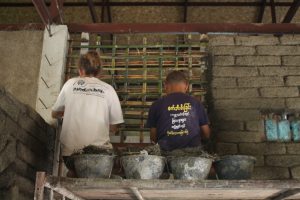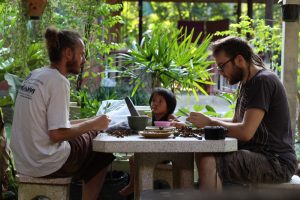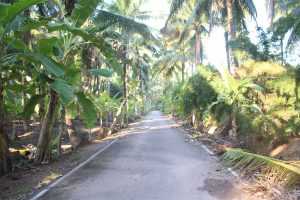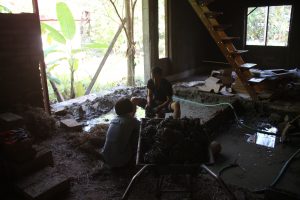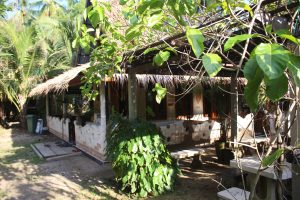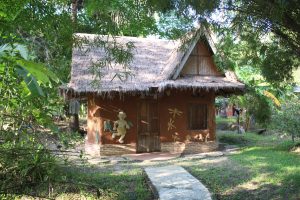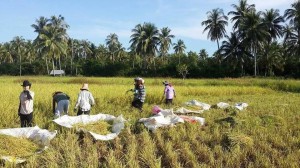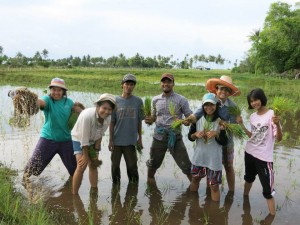Creative English teaching and activities with kids)
DaLaa MLTV project – code: 1702
Periods available: All year round (except March, April and October)
at least 2 months
Expected number of volunteers: 2 to 4
SHORT DESCRIPTION
Volunteers will join a small Muslim community of South Thailand on the banks of Songkhla Lake. They will organize activities for children of the local school and share the life of the villagers.
HISTORY and REASONS OF THE PROJECT
Ko Nang Kham is a small village situated in Pattalung province, close to the middle part of Songkhla Lake which is Thailand’s biggest lake. The community area is a small island inside the lake so the main career of the villagers is fisheries. Some work on rubber and palm plantation, fruit orchards or shrimp farm. During free time, some villagers gain some extra income from making and selling local desserts and fruit preservation, for instance. You may find more information about Songkhla lake on this following website: http://en.wikipedia.org/wiki/Songkhla_Lake. The villagers of Koh Nang Kham are Muslim.
The School
Ban Ko Nang Kham School was founded in 1928. It’s a local governmental, educational opportunity-expanded school offering classes from kindergarten to grade 9. There are around 189 pupils and 16 teachers. In the village, there’s a mosque where it is centred to bring all Muslims in the community to join in religious activities such as Friday prayer. The long-lasting folk wisdom passing on from one generation to another still gives them a career in the fishery industry and food process. Around the Songkhla Lake, the overwhelming ecosystem of natural resources, aquatic animals, fruits of the palm trees and many other things that people there can make use of, they are still greatly abundant in the present day. This teeming treasure behind this richness still gives them every day’s earnings and it has laid great benefit in preservation from generation to generation.
Mr. Somhit Chobngam (Crue Chem), the project initiator, positioned currently in Ban Ko Nang Kham Nuea School together with his co-mate, Miss Aree Leesom positioned presently in Ban Ko Nang Kham School. Both schools are in the same neighbourhood. Crue Chem contacted DaLaa first in 2015 to discuss the possibility of hosting international volunteers as he saw the importance of improving learning methods for the students. He hopes that children can learn about language and cultures naturally by doing activities with volunteers.
In 2015, we organized the first short-term work camp in Ban Ko Nang Kham Nuea School. Other work camps held yearly after that and we had the first team of middle-term volunteers in 2017 for 2 months. The results were very positive and it drew a lot of intention for kids and their families.
In small communities in Thailand, local people hardly have contacts with foreigners, while students are getting pressured from the current educational system to study English but they never have a chance to meet any foreigners. Therefore, this will give them the chance to gain motivation to learn and explore cultural diversity by doing creative activities with international volunteers.
Having international volunteers to learn about local fisherman’s lifestyle, it will help the fishermen to feel more motivated to preserve their local knowledge and wisdom. Apart from that, volunteers can also become the link between children and villagers to take part in this community learning activities.
AIMS of the PROJECT
• To support in all school’s activities
• Children and adults can learn English with volunteers
• 2-way learning process between local children/ villagers and volunteers
• Better understanding of local culture
• To build a good relationship between volunteers and local people
WORK AND ACTIVITIES
Volunteers will be arranging creative activities with students. They will be supervised by the teachers. Depending on the volunteers’ skills, they will be proposed to organize activities with each class from Grade 1 to Grade 9 twice a week (1-hour session). The idea is that 1 session is more about the English language while the other one is free to decide. Outside the school, a few villagers are willing to invite volunteers to learn about the local fisherman lifestyle on Songkhla Lake and organize other common activities.
REQUIREMENTS
- Volunteers who apply for this project should be over 20 years of age and/or have a Bachelor’s Degree. This is specifically required by the school.
- Volunteers should be ready to stay in a remote area, to adapt to the local conditions with basic facilities and with very few people able to speak in English.
- Volunteers should be able to handle the spontaneous working environment and constant changes in the plans. The mentality and way of thinking are very different from the western world. There will have often activities with the children.
- To have creativity in providing learning activities for kids and join in activities related to school’s matters
- Be open-minded, be positive-thinking and be ready to get involved in community’s matters
- Last but not least, love being around with kids J
FOOD and ACCOMMODATION
Volunteers will stay in a local house situated in the village center. There are a kitchen and bathroom in the house. Volunteers can go on foot to the project school which is not far. There will be a simple mat, pillow and mosquito net. You may need to bring your own sleeping bag and other sleeping gear for your comfort. Lunch will be offered at school. There are some small grocery shops in the village and a lot of fish from the fishermen. Local people eat rice (or noodles) 3 times a day with side dishes like curries, omelettes, local leaves and vegetables. Remember there are no pork products provided in the village. Be reminded of not bringing non-halal food or alcohol drink to your house or school. This may sound serious when you first hear it. It is not as that strict as you may imagine. Just the food (pork products and alcohol) that it is not appreciated in the Muslim community.


